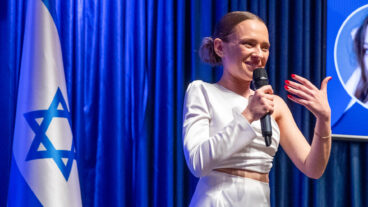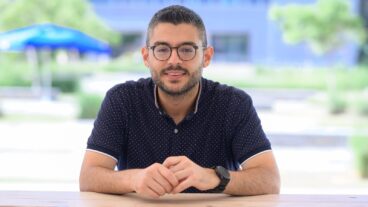Lior Yaron: You’d be surprised at just how much Israel and China have in common when it comes to conditions for dairy farming.Despite their impressive Holstein pedigree, they were a motley bunch of cows – some spewing out meager quantities of milk with just one working udder.
Four years later, the same collection of cows outside Beijing has nearly doubled its milk production and become the wonder of China, attracting astonished visitors from all over Asia.
The man responsible for the transformation of this dairy farm into a world showcase is Lior Yaron, Israeli cow expert extraordinaire.
With his shaven head and piercing eyes, the 39-year-old Israeli is something of a celebrity in China.
“We are making a difference in the country,” says Yaron, with a satisfied smile, dark shades perched on his smooth pate.
In 2001, Yaron was hired by MASHAV (the Center for International Development Cooperation) of the Israeli Foreign Ministry – at China’s request – to set up and run a demonstration dairy farm there. The work he has done at the Sino-Israel farm project in Yongledian won him the 2003 ‘Great Wall Friendship Award’ – a prestigious prize awarded by the mayor of Beijing – traditionally given to large foreign corporations that invest huge sums in the country.
MASHAV’s and Yaron’s investment -consisting more of expertise than money – is paying off nicely for China. The success of the experimental farm has led to a mushrooming of similar models around the country – and is very gradually altering the Chinese diet to include more milk and dairy products. And dairy herds – many, of North American lineage – are finally realizing their glorious potential.
How does Israel – miniscule in territory and population – serve as a model for China?
“You’d be surprised at just how much Israel and China have in common when it comes to conditions for dairy farming,” says Yaron, on a brief visit home to attend a dairy conference in Jerusalem. “Like Israel, half of China is desert – and both have an acute shortage of water.”
That’s why you won’t find grazing pastures in Israel.
“In Israel, we use technology to compensate for what we don’t have – land and water – and in the process, we have turned a disadvantage into an asset,” explains Yaron, who has been tending cows since he was a child on Moledet, a moshav (cooperative agricultural farm) in the Jezreel Valley.
Israeli dairy farming is highly intensive, relying on a total-ration feed mix, advanced automated milking equipment, and computer-based management systems – all developed locally, and many sold worldwide.
The result is that Israeli dairy cows are the most productive in the world, averaging 25,432 pounds of milk per cow per year, compared to 18,747 pounds achieved by American cows; 17,085 by Canadian ones; 13,778 by European Union cows; and 10,207 by Australian ones.
Yaron, who has a Master’s degree in animal nutrition from the Hebrew University’s Faculty of Agriculture, and many years experience training Israeli dairy farmers, introduced the ‘Israeli way’ to China.
“When I first came to the farm in China, the cows were sleeping on a cement floor. I brought in an Israeli architect to redo the living quarters – to provide soft bedding, upholstered areas and other comforts,” Yaron told ISRAEL21c. “If a cow is not comfortable it doesn’t eat, and doesn’t give milk.”
Yaron also invited Israeli veterinarians to treat the cows, many of whom were suffering from mastitis. He changed the strict eating regimen, enabling the cattle to munch whenever they like, and introduced the first computerized management systems ever used on Chinese dairy farms.
The result: the same cows that were providing an average of just over 11,000 pounds of milk per cow per year in 2000, produced 20,900 pounds in 2003, and a record 22,220 pounds last year. (The average annual milk production of a cow in China is about 6,600 pounds.)
“These cows finally realized their genetic potential,” says Yaron, noting that the herd of 1050 was derived from top-quality Holstein bulls of Canadian origin, known for being especially robust.
“The accomplishment was the result of successful team work between Chinese and Israeli managers,” adds Yaron.
In the wake of the success of the farm at Yongledian, Yaron was asked to manage another dairy farm of 3000 cattle near Beijing, and a third one – of 5000 cows – in Shanghai. Much of the time, he is on the go, crisscrossing China as a consultant and instructor for over 50 other dairy farms.
Meanwhile, visitors from all over Asia have been converging on the Demo Farm to gawk at its accomplishments, and apply some of the same principles to their own dairy farms. “We have hosted delegations from Thailand, Viet Nam, Korea and Malaysia,” he notes.
Yaron lives in Beijing with his wife, Yael, and their three children – the youngest of whom, he likes to say, was “made in China.”
He has picked up some Chinese, but for the most part, communicates with the help of an English-Chinese translator who accompanies him most of the time. But that alone is not always enough to bridge the cultural gap.
The casual moshavnik is used to wearing sandals and a t-shirt; in China, the standard attire of a dairy farm manager is a suit and tie. Israeli farmers won’t hesitate to tell Yaron when they think he’s talking nonsense.
“Here, I’m called ‘the boss’ – and no one will disagree with me. It’s a kind of deference I would never get at home.”
By the same token, Yaron has had to learn to guard his tongue. “You may be right about something, but in China you cannot confront someone directly. You must never cause a person to ‘lose face’ or he will never cooperate with you in the future. That has taught me a lesson in restraint and patience – which is not easy for a hot-tempered guy like me!”
The encounter has been a learning experience for both sides. “When I first came here,” recalls Yaron, “most of the people I spoke to were convinced that Israel was an empire of at least 100 million inhabitants. After all, we’re always in the news. They just couldn’t believe that the entire population of Israel is just half that of Beijing.
“Today,” he continues, “people here speak about the farm with pride; they call it the ‘Israel Farm.’ They have become avid ambassadors for Israel.”












